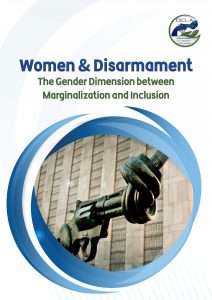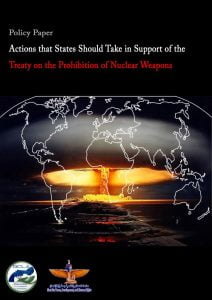The Global Coalition for Limitation of Armaments Issues its First Publication Calling on the International Community to Activate the Text of Article 26 of the United Nations Charter and Adopt a Proactive Approach to Dealing with the Risks of Climate Change
Today, Sunday, March 20, 2022, the Global Coalition for Limitation of Armaments issued its first analysis paper entitled “The Impact of Climate Change and Disarmament on International Security“. The paper addressed the relationship between the effects of climate change and the proliferation of weapons on international security, in addition to the policies and measures that can be adopted in order to reduce the effects of these variables on international peace and security. The paper showed that the threats to international peace and security are changing constantly and take different forms overages. Climate change and competition over natural resources became among the increasingly important root causes of violent conflicts and the proliferation of weapons around the world.
The analysis paper also pointed out that large-scale environmental and climate changes may create a favorable environment in which armed organizations can prosper and grow. Several security studies affirmed the clear relationship between climate, conflict, and weaponization of water. For example, terrorist organizations in Somalia, such as the Mujahideen Youth Movement, began using the crisis of water scarcity triggered by climate changes as a new weapon. They changed their combat tactics from guerrilla wars to trying to deprive the liberated cities of access to water sources.
Climate change also threatens the water security of Arab countries. The Israeli occupation forces seek to steal fresh water from the occupied Palestinian territories, Syria and south Lebanon because it suffers from severe water poverty. Israel takes about 813 million cubic meters of water annually from Syrian lands alone.
Commenting on the analysis paper, the Global Coalition for Limitation of Armaments indicated that the climate crisis will increase the risks of violent armed conflicts within countries, and thus disarmament and non-proliferation are necessary to prevent violent conflicts and wars. The Coalition called on the international community to establish mechanisms and develop general rules in the texts of the United Nations Monitoring, Verification and Inspection Commission (UNMOVIC) to reduce the effectiveness of the disarmament process.
The Global Coalition also stressed the activation of the text of Article 26 of the Charter of the United Nations, which demands disarmament and reduced military expenditures as a precondition for increased security, development, and peace. Article 26 places the Security Council, along with a Military Staff Committee referred to in Article 47, at the center of developing plans to “add curricula to regulate armament” in addition to work on strengthening cooperation to develop monitoring and early warning systems for climate disasters, while adopting a proactive approach to address the risks of climate change, as well as applying a multi-dimensional approach to conflict resolution and creating a more peaceful, healthy and secure world.
The Coalition also recommends the states to respect and recognize the right of access to information and participation for all people affected by climate change and its security implications, in addition to respecting their right to effective remedies for human rights violations.






